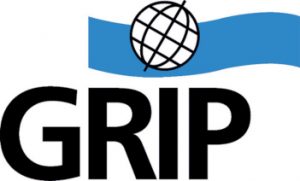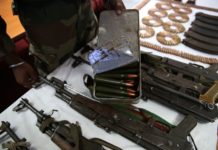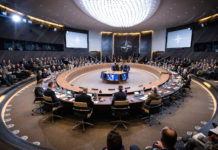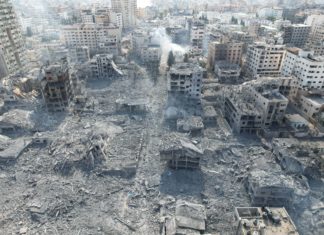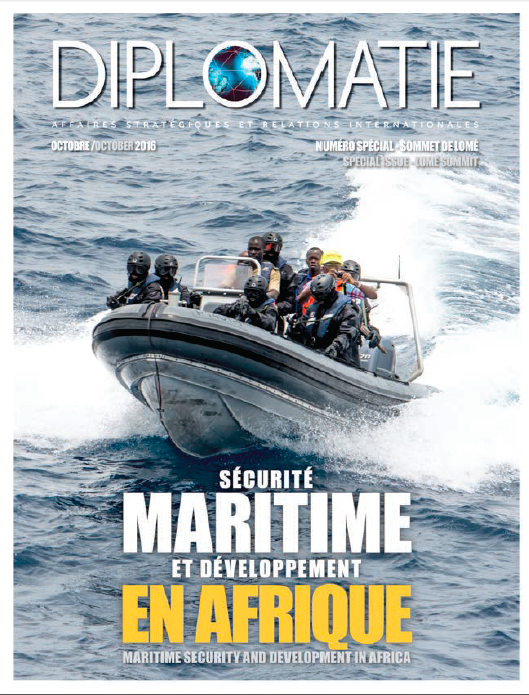(French Version)
While maritime insecurity is confirmed as one of the major threats to the security and economic stability of the Gulf of Guinea, both for the coastal States and for those isolated inland that depend on maritime trade, the rapid increase in acts of piracy and maritime robbery has taken several countries of the sub-region by surprise.
This Insight was published in the special issue of Diplomatie magazine in October 2016, focused on maritime security and development in Africa. This bilingual special issue will be distributed among diplomatic circles around the Lome Summit which will take place on October 15, 2016.
In June 2013, the heads of the Economic Communities of the West African States (ECOWAS) and of the Economic Communities of the Central African States (ECCAS), and the Gulf of Guinea Commission (GGC), united in Yaoundé in Cameroon, laid the foundations for a strategy common to both regions. The Yaoundé summit closed with the adoption of a code of conduct relating to the prevention and suppression of illegal acts perpetrated in the maritime space of the Gulf of Guinea. Largely inspired by the Djibouti Code of Conduct relating to fight against piracy in the Indian Ocean and Gulf of Aden, the Yaoundé Code of Conduct forms the legal basis for cooperation between the signatory States of both regions. It defines the terms of intervention, sharing of responsibilities and practical organization of the fight against illegal maritime activities in western and central Africa.
In effect since 25th June, 2013, it was only a preliminary agreement which would become enforceable after a period of three years, during which time it was to be assessed and possibly amended. A memorandum of agreement and political declaration had also been adopted. The memorandum, signed by the ECOWAS, ECCAS and GGC, organizes the relations between the regional maritime safety and security centers while the declaration of the heads of State confirmed their political support.
The maritime safety and security structure, inspired by the acts of Yaoundé, is composed of the Interregional Coordination Center (ICC), a body for the coordination that establishes a junction between the Central Africa Regional Maritime Security Centre (CRESMAC) and West Africa Regional Maritime Security Centre (CRESMAO). The coastal space of the two economic communities is subdivided into operational maritime zones whose activities are coordinated within Multinational Coordination Centers (MCC). The CRESMAC[1] and CRESMAO[2] respectively cover two and three MCCs, representing the number of operational maritime zones under their governance.
On a national level, it is expected that a maritime operations center (MOC) will be created per country and will unite, in addition to the national navy that will ensure coordination, the major players of the State’s action at sea (maritime police, customs, fishing and environmental protection). The structures of the ECCAS saw the beginning of operations with the appointment of a director of the CRESMAC based in Pointe-Noire (Republic of the Congo). The CRESMAO expected to be based in Abidjan (Ivory Coast) is still in the project stages[3]. Generally, the entry into operation of the structures appears thwarted by insufficient resources and a lack of long term funding mechanisms[4]. Thus, barely inaugurated in September 2014, the ICC saw the eviction of its director after a polemic on the management of the initial funds allocated by the Cameroon government in the startup phase of the center[5]. Moreover, three years after the Yaoundé summit, the code of conduct signed by the stakeholders is still not enforced.
As underscored by Samuel Nguembock, “one of the recurring pitfalls in the construction of security-related multilateralism in the Gulf of Guinea is related to the capacity and desire of the neighboring States to cooperate with each other despite the initiatives and technical and operational support of foreign powers and global multilateral bodies[6]”.
The Stakes of the Lomé Summit
One of the major challenges of the African Union extraordinary summit on maritime safety and security and development in Africa, called for 15th October, 2016 in Lomé, is to avoid the quicksand of the Yaoundé process. The stated ambition is henceforth the adoption of a new legal instrument, an African charter that aims to conciliate the harmonious and effective coordination of the interventions of the States at sea with social and economic development objectives. The Lomé charter will be adopted in the framework of the 2050 African Integrated Maritime strategy, whose purpose is also to make the maritime space one of the main levers of the economic and social development of Africa. The particularity of the Lomé summit is to balance safety at sea with development. Economic operators will thus be associated with the process.
Beyond piracy, the Lomé summit will cover all forms of organized crime at sea[7] and recommend measures, upstream, to discourage illegal acts at sea. Currently, all the initiatives focus only on the detection and suppression of these acts. Finally, unlike the Yaoundé Code of Conduct, that only concerns the countries of the Gulf of Guinea, the Lomé charter aims for a continental scope.
However, despite the efforts undertaken by the States to set up specific institutional structures to manage maritime issues[8], bringing this ambitious African maritime structure into operation still appears to be a long term objective. It not only depends on the reinforcement of the coordination and harmonization of legislations at the inter- State and inter-regional levels, but also on the delimitation of maritime borders. The support of technical and financial partners proves indispensable for the viability of an integrated regional security system. Another of the major challenges is that of a risk of inertia and decisionmaking heaviness, with the multiplication of structures whose articulation could prove problematic.
The path of the African Standby Force is an illustration, with the decision of the African Union to build an African Capacity for Immediate Response to Crises (ACIRC) while the placement into operation of the African Standby Force remains to be done. The creation of the ICC renews to a certain extent this scenario at a time when efforts to reform and reinforce the capabilities undertaken both by the States and the regional structures, are not yet complete[9].
In the wake of the Lomé summit, the AU and its regional components will undoubtedly be called upon to rethink the role and articulation of certain structures of the maritime safety and security system.
The Maritime Organization of Western and Central Africa (MOWCA)[10], like the GGC[11] could have claimed the role of coordination of the integrated maritime strategy, attributed to the ICC, due to the growing interdependence of all maritime issues (trade, safety, environment among others). A number of experts feel that instead of creating the ICC, the ECOWAS and ECCAS could have assigned the responsibility to the MOWCA of establishing the junction between the CRESMAO and CRESMAC. Furthermore, the attribution of the assignments of coordination and operational capabilities to a limited number of bodies would reduce the financial constraint that weighs on most of the member States due to their belonging to several regional organizations, within which they are forced to finance through national contributions. For the moment, it is urgent to strengthen the presence at sea of neighboring countries without neglecting the profound causes of maritime insecurity.
Author
Michel Luntumbue is in charge of research at GRIP (Group for Information on Peace and Security) in the field of “Conflicts, Security and Governance in Africa”.
Download in PDF :
The Long March of African Maritime Safety and Security in the Gulf of Guinea
Projet financé par le Ministère de la Coopération et de l’Action humanitaire du Grand-Duché de Luxembourg : Contribution à l’amélioration de la sécurité humaine, à la prévention des conflits et au renforcement de l’état de droit en Afrique sub-saharienne
[1]. The CRESMAC covers two maritime zones: zone D with one MCC located in Douala (Cameroon) and zone A with an MCC that will be established in Luanda (Angola).
[2]. According to unofficial sources, the ECOWAS could be restructured to include Guinea in zone G so that this country could host the MCC of said zone. Accra, in Ghana, has already been designated to host the MCC of zone F.
[3]. Only the MCCs of Douala, in Cameroon (zone D), and Cotonou, in Benin (zone E), are operational.
[4]. During its extraordinary high level meeting devoted to the ICC last February, it was recommended that the member States provide 40% of the resources necessary that would be supplemented by the bilateral and international partners. The placement into operation of the center is slated for some time between July and December 2016.
[5]. Jean-Bruno Tagne, “Flou, les 310 millions de la discorde” (Fuzzy, the 310 millions of discord), Le Jour, 15 December 2015.
[6]. Samuel Nguembock, “La construction du multilatéralisme sécuritaire dans le golfe de Guinée : les risques potentiels d’une hypertrophie institutionnelle” (The construction of the multilateralism of safety in the Gulf of Guinea: the potential risks of institutional hypertrophy). International conference on maritime security in the Gulf of Guinea, Lisbon, 11 July 2014.
[7]. Drug trafficking, illegal fishing, illegal toxic waste spillage, trafficking of arms and migrants or human slave trade.
[8]. Creation of maritime prefectures and a national organization in charge of the State’s action at sea in Benin, Togo, Senegal, etc.
[9]. Samuel Nguembock, op. cit.
[10]. In charge of maritime transport and marine environment issues since 1975, the MOWCA is taking an increasing interest in the issues of maritime safety and security with its plan to develop a coast guard network and incorporate different bodies of the State’s action at sea
[11]. In charge of the arbitration of territorial disputes in the maritime domain of the Gulf of Guinea, but lacking operational capabilities, the GGC could see its prerogatives taken away, or disappear. Conflicts on the delimitation of maritime borders could be settled in the Regional Economic Communities (REC) and via regional mechanisms. Meeting of the representatives of the member states of the ECOWAS and ECCAS in Cotonou, Benin, to tackle the issue of maritime security. (© US Africom/Olufemi A. Owolabi).
